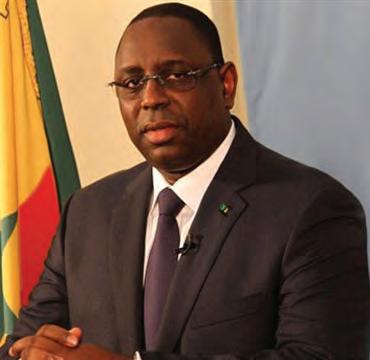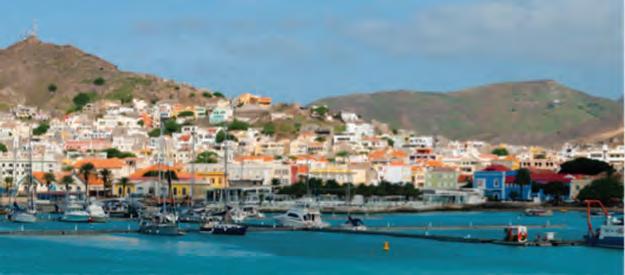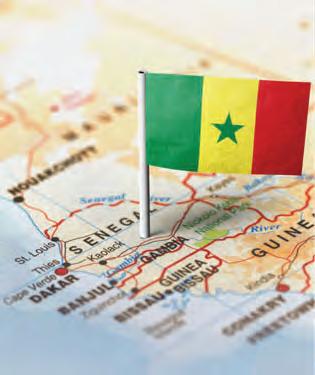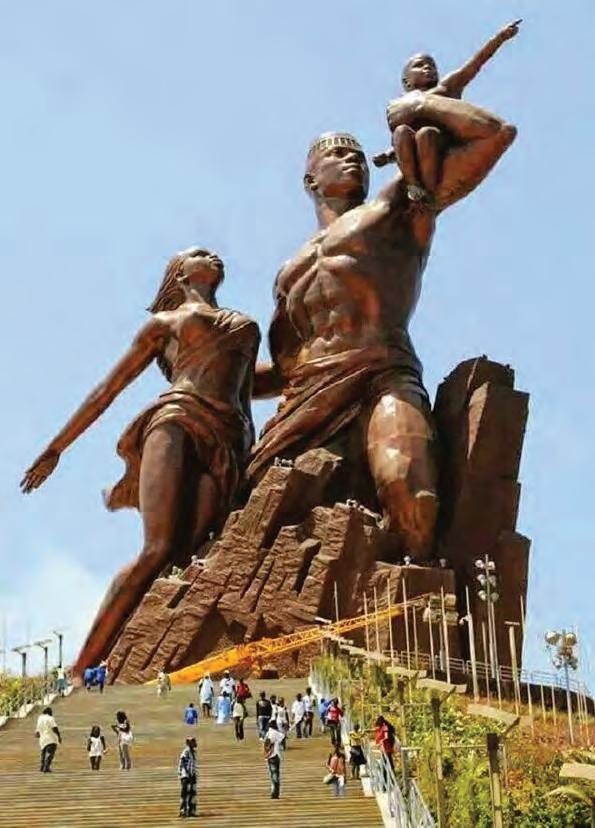
8 minute read
Republic of Senegal
Na onal Profi le
Offi cial Name:
Republic of Senegal
Government Format:
A unitary state: Presiden al Republic
President:
Head of Government
Name President:
Macky Sall

Region:
WestAfrica
Es mated GDP:
US$24.13 billion (2019)
Republic of Senegal By Africa Business Association
Es mated Popula on:
17 million
Overview:
Senegal is among Africa’s most stable countries, with three major peaceful poli cal transi ons since independence in 1960. Senegal off ers a stable poli cal environment, a favorable geographic posi on and strong ins tu ons with growing opportuni es for foreign investment. The Government of Senegal welcomes foreign investment and has priori zed eff orts to improve the business climate in what is one of Africa’s fastest- growing economies. With a GDP growth rate of 6.6% in 2016, Senegal is classifi ed among the top three fastestgrowing economies in Africa, behind Côte d’Ivoire and Tanzania. With a low infl a on rate of only 1% in 2016, Senegal's monetary policy mirrors the objec ves of economic stability and growth. Since 2004, its regional currency, the CFA franc, has been stable at a peg of 655.96 CFA franc per euro. According to Interna onal Monetary Fund (IMF) es ma ons, a stronger and sustainable annual growth rate is an cipated up un l 2021, es mated to be 7-8%. This is underpinned by exports, as well as foreign and local investments. Bordered by Mauritania in the north, Mali to the east, Guinea to the southeast, and Guinea-Bissau to the southwest. Senegal also shares borders with the Gambia and a mari me border with Cape Verde.
Value Proposi on
Economic growth in Senegal has surged over 6% since 2015 – and the trend is expected to con nue in 2018 and beyond. Growth reached 6.2% in 2016 and 7.2% in 2017, led by the primary sector with around 13% of growth, boosted by fi shing and agriculture. The secondary sector also grew rapidly at 4.5% supported by food; chemicals and extrac ves (phosphates and gold). Services grew at 6.6% thanks to transport and fi nancial and intermedia on services. Ongoing reforms, higher total investment, and adequate climate condi ons help explain Senegals performance.

What does your na on off er that an investor’s value proposal on needs?
Senegal has a lot going for it: Its stable democracy, great irriga on poten al, religious tolerance, and proximity to markets in Europe and North America. Senegal has some of the richest fi shing grounds in the world, and the industry already plays a central socioeconomic role there. Importantly, the sector not only generates a large number of jobs directly, but also creates opportuni es indirectly, through opportuni es in fi sh processing and distribu on, both of which primarily employ women.
Development in Senegal
Senegal is today among the fastest-growing economies in Africa. In 2014, Senegal adopted a new development model to accelerate its progress towards becoming an emerging economy. The ESP 2014-18 was developed to adopt a model focusing on accelera ng the GDP growth rate and providing be er living condi ons for the popula on. It establishes the framework for the country’s economic and social policy over the medium and long term and calls for Senegal to be an emerging market by 2035, as well as a business hub for the region.
Doing Business In Senegal:
Senegal offers a compe ve des na on for investments in Africa on account of its poli cal stability, strategic geographical posi on, access to subregional markets and improving infrastructure. Many interna onal organisa ons and businesses have made Dakar their base for opera ons across the West African region. Senegal has shown commitments towards improving its business environment. The country has adopted the Three-year Program of Business
Environment and Competitiveness Reforms (2013-15
PREAC) updated to cover 2016-18. Recent measures include the reduc on of the property transfer tax to 5% from 10% in 2013. The minimum capital required to start a business was abolished in 2015 as well as stamp du es on business start-ups. According to the World Bank’s 2016 Doing Business report, the country is one of the world's top business reformers and among the top ten business environment improvers for two consecu ve years. Senegal ranked 147th out of 190 countries in 2017, a six-posi on improvement from its 2016 ranking.
What is your promise to investors?
Senegal is West Africa’s fourth largest economy – behind Nigeria, Cote d’Ivoire and Ghana, all of which export commodi es such as oil, cocoa and coff ee. In contrast, it was obvious from the start that Senegal would have to rely on knowledge and crea vity. Its infl uence in Africa is greater than its small popula on of not quite 17 million would suggest. Senegal does not have natural resources – though oil was recently found off shore. To date, however, the basis for Senegal’s development has been educa on. About 40 % of the na onal budget is spent on this sector.
What services do you provide for your investors?
With a healthy and compe ve economy, Senegal has a propor onally small market, but not only because of its bridge func on for the West African market, which is much more accessible compared to other African countries. In view of the poten al of the import-export market, many entrepreneurs are wondering how to import to Senegal. This is perfectly normal, since the country grants great freedom of establishment for investors in the tex le, fi shing, agrifood, tourism, mining and new technologies sectors. As a result, foreign companies and investors

from page 27
have the same opportuni es in their ac vi es. Foreigners can therefore benefi t from 100% share in a company, provided that the required legal procedures are followed. The commercial culture and agricultural subsistence are not diversifi ed enough, and this gives you the opportunity to invest in new products. In addi on, this pla orm allows you to both adopt products already on the market for an aff ordable price, but also to introduce completely new ar cles that have already been successful for other African businesses. The tax code reform, which entered into force in January 2013, refl ects the government’s aspira on to use the tax system as an instrument to support economic growth. Declaring and paying taxes has become easier. Eff orts to develop paperless opera ons are well underway and include: • the Generaliza on of e-VAT repor ng for SMEs • paying taxes online using an e-tax pla orm • fee exemp ons for online payments; • a 50% reduc on in the no fi ca on period (from 26 to 13 days) • guidance on repayment schedules for VAT.
Six Sectors of Investment Opportuni es in Senegal
The country's main growth drivers are private projects, but the capital of Dakar brings together a good number of consumer goods manufacturers who invest in the crea on or expansion of their produc on lines. There are a number of sectors in which foreign companies can be considered as suppliers. These are:
Telecom and ICT
With the evolu on of the telecommunica ons sector, Senegal has become one of the most important countries of South-North outsourcing. Currently, there are three mobile service providers and thanks to the Telecommunica ons and Postal Regulatory Agency, the country has had an independent supervisory authority for the sector since 2001. While the expansion of the fi xed network is languishing, it is now also accessible in the most remote parts of the country by mobile phone, and Senegal has one of the highest mobile user densi es on the African con nent.
Oil & Gas (and Mining) Services
Senegal’s ambi on to boost oil explora on and investment has drawn the a en on of foreign oil, gas and mining (OGM) companies. Planned explora on has focused on the produc ve Mauritania-SenegalGuinea Bissau Basin. The basin – as its name indicates – covers a few neighboring countries. OGM companies regard the basin as an entry point into West Africa and an opportunity to build a regional presence.
Heavy Industry & Construc on
New construc on is evident across Senegal’s main ci es as authori es look to upgrade exis ng infrastructure, from ports to roads. This government mandate drives the demand for the heavy industry supplies, par cularly in the cement sector. A strong regional demand for construc on supplies adds another signifi cant boost to the sector.
Banking and Finance
Some investors believe that Senegal can posi on itself as a center for Islamic fi nance, as a country with an approximate 95% Muslim popula on. About 54% of West Africa’s popula on is Muslim. The eightcountry West African Economic and Monetary Union (established in 1994 promote economic integra on among countries that use the same CFA franc currency) is symbolically led by Senegal, a country that rises above the rest for its stability.
Tourism
Tourism is the country's second source of currency. Although it has encountered some diffi cul es before,

African Renaissance Monument booking.com
it is moving in the right direc on. So if the situa on remains stable, the number of tourists should con nue to increase.
Natural resources:
Fish, peanuts, phosphate, iron ore, gold,
Industries:
Agricultural and fi sh processing, phosphate mining, fer lizer produc on, petroleum refi ning, construc on materials.










